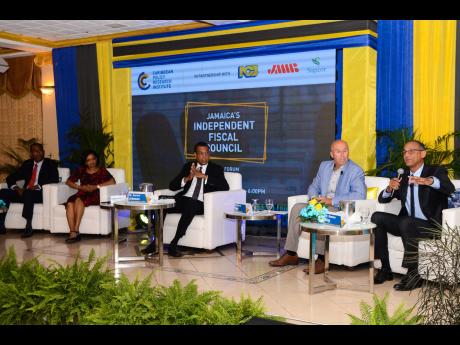The role played by the Economic Programme Oversight Committee (EPOC) in communicating with the people on the importance of fiscal discipline and meeting targets set by the International Monetary Fund needs to be maintained under the Jamaica government’s proposed fiscal council.
That’s according to IMF Mission Chief to Jamaica, Dr Uma Ramakrishnan, who said “EPOC has, I think, played a significant role in monitoring” in addition to what the fund team undertook during its quarterly reviews under the extended fund facility and the current precautionary standby agreement.
“But I think the more important role that EPOC played was communicating and educating and interacting with the people on the importance of fiscal discipline and meeting the targets,” said Ramakrishnan on Thursday at a public forum organised by think tank CAPRI on the Fiscal Council proposed by Finance Minister Dr Nigel Clarke.
“I think that is an important role that any institution going forward would have to play,” said Dr Ramakrishnan.
Clarke announced last month that the Holness administration had approved replacing EPOC with the council when the current agreement with the IMF comes to an end in 2019.
Ramakrishnan described Jamaica’s “partnership with the IMF” as unprecedented “and if I dare to say, unique, compared to global standards”.
The uniqueness of the partnership is such that “the story is not about the IMF being here. The story is about Jamaica because the ownership, the commitment that came across two governments, through civil society, through public sector, through private sector, through unions, across the board this is a very special ownership process that we have seen,” she said.
“And this informal institution call EPOC was created for the first time that I know of anywhere in the world,” the Mission Chief added.
NEED TO ASSESS TARGETS
She said the ownership that the country has shown and the commitment by both political parties – the People’s National Party and the Jamaica Labour Party – to fiscal discipline throughout the programmes thus far “I think is to be cherished. The question is, can this be maintained going forward?”
She suggested that the fiscal council should also play a role in assessing whether the government’s fiscal targets and the policies that are associated with them are in line to meet those targets.
Clarke acknowledged that EPOC has been very effective in communicating progress and in addressing changes in Jamaica’s fiscal affairs and has been an important outlet of information.
“We want to build on the successes of EPOC,” he said, noting that the Committee’s mandate “is not embedded in any law. They were just undergirded by a memorandum of understanding and what we want to do is to take that one step further and ensure that the function that we are describing is protected by the force of law,” the finance minister said.
Executive Director of CAPRI, Dr Damien King, said it is not enough to have a fiscal council, raising questions about how Jamaica get from establishing such a public institution to getting it to do its job, referencing several existing institutions which have not been effective in undertaking aspects of their responsibilities partly because of lack of resources.
In that context, he also raised questions about whether the fiscal council will have the necessary competencies, will be adequately resourced and have sufficient political independence.
“These are not all the hurdles, but these need to be addressed if we are going to have a competent institution as a fiscal council,” King said.
He said Jamaica’s economic history indicates how important it is to establish a fiscal council – an independent public institution aimed at promoting sustainable public finances through various functions, including public assessments of fiscal plans and performance.
“It is critically important that we get this right to ensure that the next 40 years we have neither the high inflation nor high debt”., to which Jamaica has been accustomed over the last four or decades, the economist said.




Leave A Comment